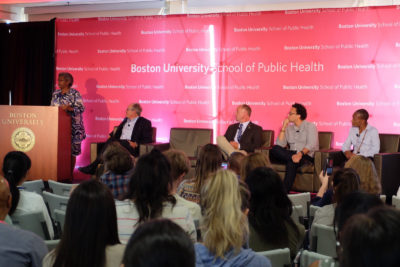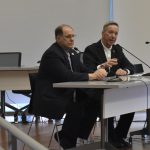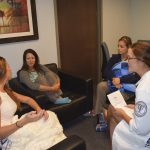
Several experts shared firsthand stories about gun violence and offered solutions to ease the issue in a panel at the Boston University School of Medicine Thursday evening.
More than 90 BU students and faculty attended the panel, which added to the ongoing national conversation about gun violence and the legislation addressing it.
Hosted by BU’s Program for Global Health Storytelling, the panel — titled “Gun Violence: Stories Behind the Numbers” — was an interdisciplinary collaboration between BU’s School of Public Health, SPH’s Activist Lab, the Pulitzer Center and BU’s College of Communication.
BUSM professor and moderator Bindu Kalesan said the purpose of the panel was to raise awareness about victims of gun violence.
“Ninety-nine people are shot dead … it leaves a trail of misery,” Kalesan said, noting gun violence’s extensive impact. “You think one person is suffering, but that’s not the case. Several people suffer, and it’s for a lifetime.”
Panelist Carlos Javier Ortiz, a photographer who captures victims of gun violence in his images, spoke on the panel about how to regulate gun ownership.
During his presentation, Ortiz shared photographs he took of people in gun violence-ridden communities, including Chicago and Philadelphia.
“I wanted to really get a sense of not just witnessing gun violence, but witnessing the trauma of having your neighbor blocked off by police tape and your environment stopped,” Ortiz said. “Young people are being injured that were able-bodied two weeks before they were shot.”
Mark Barden, another panelist, recounted losing his seven-year-old son, Daniel, during the Sandy Hook Elementary School shooting in 2012. After experiencing this tragedy, he created Sandy Hook Promise, a nonprofit organization dedicated to finding solutions to gun violence.
“You know that this is happening every day,” Barden said. “People are losing loved ones to gun-related tragedies every single day in this country. 32,000 people a year every single year in this country.”
Barden said he decided that instead of working on policy and legislation, he wanted his organization to focus on gun violence prevention.
“We have developed four programs that we can bring into schools, communities and youth-serving organizations around the country for free,” Barden said. His organization addresses social isolation and offers suicide intervention programs for adults and teachers.
Chaplain Clementina Chery, another panelist, shared her story on the loss of her son to gun violence, which led her to found the Louis D. Brown Peace Institute, a center that helps those afflicted with gun violence-related trauma.
“[Gun] violence is preventable, and it’s a public health issue,” Cherry said after the panel. “There needs to be this massive attention for peace.”
Several audience members, many of whom had personal connections to the topic, said panels like these are crucial to making progress with gun violence.
Cita Dunn, a first-year SPH student, said it was the issue of gun violence that initially led her to apply to SPH.
“Gun violence is happening everywhere, and I’m lucky enough to not be directly affected by the issue,” Dunn said. “It’s something that needs to be talked about.”
Lauren Fiske, a graduate student from London who lives in Rhode Island, whose experiences in studying gun violence led her to attend the panel, said she appreciated the interdisciplinary approach of the discussion.
“It was a great representation of professionals who are dedicated to coming together to address the fact we’re losing millions of people in our country more so than any other wars combined to gun violence,” Fiske said.
Confidence Achilike, a second-year SPH student, said from the panel, she learned about how easy it is to obtain a gun in the United States.
“It’s good to know something’s being done about it,” Achilike said. “We are more cautious and sensible and try to influence lawmakers as well to be more sensitive as well.”





Wow very informative